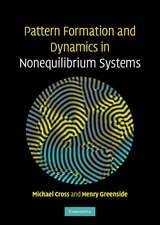Patterns and Interfaces in Dissipative Dynamics: Springer Series in Synergetics
Autor L.M. Pismen Cuvânt înainte de Y. Pomeauen Limba Engleză Hardback – 8 mai 2006
This book is a first-hand account by one of the leading players in this field, which gives in-depth descriptions of analytical methods elucidating the complex evolution of nonlinear dissipative systems, and brings the reader to the forefront of current research. The introductory chapter on the theory of dynamical systems is written with a view to applications of its powerful methods to spatial and spatio-temporal patterns. It is followed by two chapters treating moving interfaces, based largely on reaction-diffusion and phase-separating systems. The following two chapters on amplitude equations for patterns and waves describe universal phenomena generated by representative equations which can be derived for a variety of non-equilibrium systems originating in fluid mechanics, physical chemistry or nonlinear optics.
This book addresses graduate students and non-specialists from the many related areas of applied mathematics, physical chemistry, chemical engineering and biology, as well as the seasoned scientist in search of a modern source of reference.
Din seria Springer Series in Synergetics
- 15%
 Preț: 653.14 lei
Preț: 653.14 lei - 17%
 Preț: 430.21 lei
Preț: 430.21 lei - 17%
 Preț: 495.47 lei
Preț: 495.47 lei -
 Preț: 392.37 lei
Preț: 392.37 lei -
 Preț: 396.02 lei
Preț: 396.02 lei -
 Preț: 400.10 lei
Preț: 400.10 lei -
 Preț: 391.02 lei
Preț: 391.02 lei - 15%
 Preț: 641.38 lei
Preț: 641.38 lei - 18%
 Preț: 739.00 lei
Preț: 739.00 lei - 15%
 Preț: 645.60 lei
Preț: 645.60 lei - 15%
 Preț: 637.75 lei
Preț: 637.75 lei - 18%
 Preț: 727.31 lei
Preț: 727.31 lei - 20%
 Preț: 481.77 lei
Preț: 481.77 lei -
 Preț: 398.15 lei
Preț: 398.15 lei - 18%
 Preț: 742.97 lei
Preț: 742.97 lei - 15%
 Preț: 647.40 lei
Preț: 647.40 lei -
 Preț: 416.64 lei
Preț: 416.64 lei -
 Preț: 397.76 lei
Preț: 397.76 lei -
 Preț: 391.99 lei
Preț: 391.99 lei - 15%
 Preț: 644.49 lei
Preț: 644.49 lei -
 Preț: 386.99 lei
Preț: 386.99 lei - 20%
 Preț: 574.08 lei
Preț: 574.08 lei -
 Preț: 387.58 lei
Preț: 387.58 lei - 15%
 Preț: 533.53 lei
Preț: 533.53 lei -
 Preț: 396.02 lei
Preț: 396.02 lei -
 Preț: 390.25 lei
Preț: 390.25 lei -
 Preț: 392.37 lei
Preț: 392.37 lei -
 Preț: 396.40 lei
Preț: 396.40 lei -
 Preț: 408.16 lei
Preț: 408.16 lei - 18%
 Preț: 1116.09 lei
Preț: 1116.09 lei -
 Preț: 397.76 lei
Preț: 397.76 lei - 18%
 Preț: 971.64 lei
Preț: 971.64 lei - 15%
 Preț: 644.30 lei
Preț: 644.30 lei -
 Preț: 386.81 lei
Preț: 386.81 lei
Preț: 398.15 lei
Nou
Puncte Express: 597
Preț estimativ în valută:
76.19€ • 82.74$ • 64.00£
76.19€ • 82.74$ • 64.00£
Carte tipărită la comandă
Livrare economică 22 aprilie-06 mai
Preluare comenzi: 021 569.72.76
Specificații
ISBN-13: 9783540304302
ISBN-10: 3540304304
Pagini: 392
Ilustrații: XV, 373 p.
Dimensiuni: 155 x 235 x 27 mm
Greutate: 0.65 kg
Ediția:2006
Editura: Springer Berlin, Heidelberg
Colecția Springer
Seria Springer Series in Synergetics
Locul publicării:Berlin, Heidelberg, Germany
ISBN-10: 3540304304
Pagini: 392
Ilustrații: XV, 373 p.
Dimensiuni: 155 x 235 x 27 mm
Greutate: 0.65 kg
Ediția:2006
Editura: Springer Berlin, Heidelberg
Colecția Springer
Seria Springer Series in Synergetics
Locul publicării:Berlin, Heidelberg, Germany
Public țintă
ResearchCuprins
Dynamics, Stability and Bifurcations.- Fronts and Interfaces.- Systems with Separated Scales.- Amplitude Equations for Patterns.- Amplitude Equations for Waves.
Recenzii
From the reviews:
"This book presents thorough descriptions of analytical methods divulging the complex evolution of nonlinear dissipative systems, and introduces the reader to the forefront of current research. … This book addresses graduate students and non-specialists from the many related areas of applied mathematics, physical chemistry, chemical engineering and biology, as well as the seasoned scientist in search of a modern source of reference." (Ömer Kavaklioglu, Zentralblatt MATH, Vol. 1098 (24), 2006)
"This substantial monograph summarizes a broad selection of results concerning the dynamics of model nonlinear dissipative partial differential equations. … The layout and figures are generally very clear and the material is well-organised. … Overall I recommend this book as a very useful reference and guide to the literature. It will undoubtedly be of use to those working in very different areas of nonlinear science." (Jonathan Dawes, Fluid Mechanics,Vol. 584, 2007)
"The book begins with a brief overview of dynamical systems theory, which is helpful for understanding the bulk of the book. … In summary, this book is a clear and comprehensive review of this interesting area of pattern formation, and usefully complements existing texts. It is particularly useful as a reference to the development of the theory of stability of fronts and defects." (Alastair M. Rucklidge, Mathematical Reviews, Issue 2008 f)
"This book presents thorough descriptions of analytical methods divulging the complex evolution of nonlinear dissipative systems, and introduces the reader to the forefront of current research. … This book addresses graduate students and non-specialists from the many related areas of applied mathematics, physical chemistry, chemical engineering and biology, as well as the seasoned scientist in search of a modern source of reference." (Ömer Kavaklioglu, Zentralblatt MATH, Vol. 1098 (24), 2006)
"This substantial monograph summarizes a broad selection of results concerning the dynamics of model nonlinear dissipative partial differential equations. … The layout and figures are generally very clear and the material is well-organised. … Overall I recommend this book as a very useful reference and guide to the literature. It will undoubtedly be of use to those working in very different areas of nonlinear science." (Jonathan Dawes, Fluid Mechanics,Vol. 584, 2007)
"The book begins with a brief overview of dynamical systems theory, which is helpful for understanding the bulk of the book. … In summary, this book is a clear and comprehensive review of this interesting area of pattern formation, and usefully complements existing texts. It is particularly useful as a reference to the development of the theory of stability of fronts and defects." (Alastair M. Rucklidge, Mathematical Reviews, Issue 2008 f)
Textul de pe ultima copertă
Spontaneous pattern formation in nonlinear dissipative systems far from equilibrium is a paradigmatic case of emergent behaviour associated with complex systems. It is encountered in a great variety of settings, both in nature and technology, and has numerous applications ranging from nonlinear optics through solid and fluid mechanics, physical chemistry and chemical engineering to biology. Nature creates its variety of forms through spontaneous pattern formation and self-assembly, and this strategy is likely to be imitated by future biomorphic technologies.
This book is a first-hand account by one of the leading players in this field, which gives in-depth descriptions of analytical methods elucidating the complex evolution of nonlinear dissipative systems, and brings the reader to the forefront of current research. The introductory chapter on the theory of dynamical systems is written with a view to applications of its powerful methods to spatial and spatio-temporal patterns. It is followed by two chapters treating moving interfaces, based largely on reaction-diffusion and phase-separating systems. The following two chapters on amplitude equations for patterns and waves describe universal phenomena generated by representative equations which can be derived for a variety of non-equilibrium systems originating in fluid mechanics, physical chemistry or nonlinear optics.
This book addresses graduate students and non-specialists from the many related areas of applied mathematics, physical chemistry, chemical engineering and biology, as well as the seasoned scientist in search of a modern source of reference.
This book is a first-hand account by one of the leading players in this field, which gives in-depth descriptions of analytical methods elucidating the complex evolution of nonlinear dissipative systems, and brings the reader to the forefront of current research. The introductory chapter on the theory of dynamical systems is written with a view to applications of its powerful methods to spatial and spatio-temporal patterns. It is followed by two chapters treating moving interfaces, based largely on reaction-diffusion and phase-separating systems. The following two chapters on amplitude equations for patterns and waves describe universal phenomena generated by representative equations which can be derived for a variety of non-equilibrium systems originating in fluid mechanics, physical chemistry or nonlinear optics.
This book addresses graduate students and non-specialists from the many related areas of applied mathematics, physical chemistry, chemical engineering and biology, as well as the seasoned scientist in search of a modern source of reference.
Caracteristici
Comprehensive, self-contained, and methodically unified survey of pattern formation in reaction-diffusion systems











